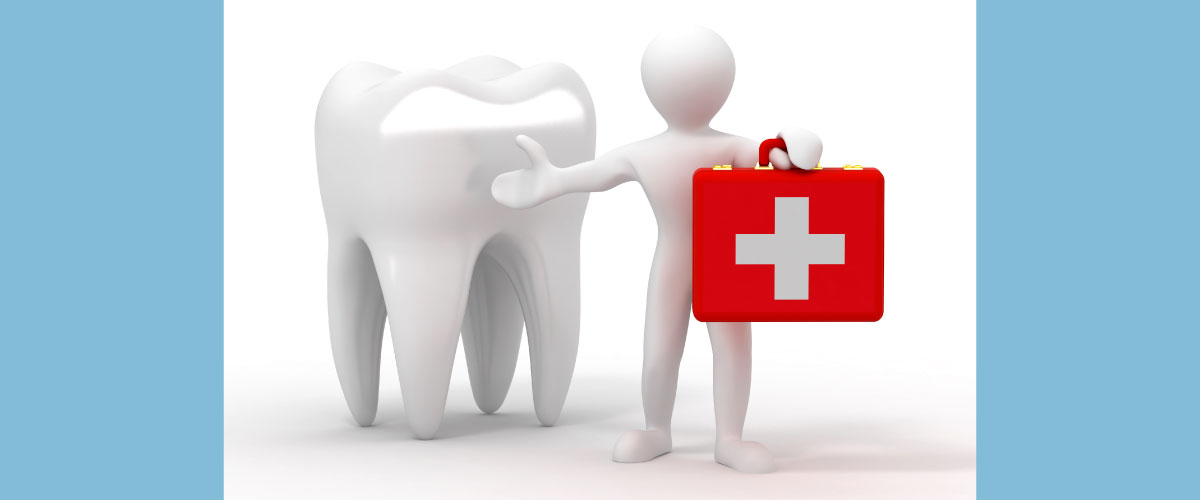Dental emergencies are fairly common in children and adults. They can include; bleeding from the mouth due to an injury or getting hit it the face, cracked and broken teeth, oral infections and extreme pain. Whenever you encounter a dental emergency, it’s extremely important to see a dentist or a medical professional right away in order to prevent further injury and restore the mouth to health.
Types of Dental Emergencies
- Abscesses/Infections – Abscesses and infections typically occur as the result of poor oral hygiene and gum disease. You may also experience an increased risk if you have a chronic health condition, like diabetes. Oral infections can spread throughout the body if not treated promptly.
- Bleeding From the Mouth/Mouth Injury – Getting hit in the mouth or falling on your face can cause injuries to the mouth and gums. If you notice bleeding from a mouth injury, it is important to perform basic first aid and travel to a dentist right away.
- Cracked or Broken Tooth (Teeth) – Broken tooth (teeth) can occur from biting hard food or candy or getting hit in the mouth. If you have a cracked tooth, it’s important to find the pieces and visit a dentist so that the tooth can be repaired.
- Extremely Loose Tooth – Loose teeth can occur as the result of tooth decay, gum disease or a mouth injury. In some instances, a dentist may be able to repair and stabilize the tooth so that it does not have to be extracted.
- Knocked Out Teeth – Experiencing one or more knocked out teeth is a dental emergency. This often occurs due to getting hit in the face or having your jaw impact a hard object. If you save the knocked out teeth and get to a dentist quickly, the teeth may be able to be reimplanted.
- Severe Toothache – Severe toothaches can occur due to cavities, losing a filling or gum disease and inflammation. You will need to get to a dentist as soon as possible to determine the cause of the pain.
- Tongue/Mouth Bites – If you consistently bite your tongue or mouth, you may have bite problems that can be helped by getting prompt dental care to realign your teeth. If you notice the wounds are not healing or they are exceptionally painful, you may need emergency dental care.
First Aid for Dental Emergencies
First aid for dental emergencies often involves reducing pain and swelling and finding any chips or knocked out teeth so that they can be inserted back into the mouth. Many dentists also recommend creating a dental first aid kit, which is similar to the general first aid kits that you may keep in your home and car.
Cold Compresses and Pain Medications
For mouth injuries, swelling and toothaches, it may help to place a cool, wet washcloth or ice pack to the side of the face. Additionally, you can take a pain medication, like Tylenol, or use an oral anesthetic to help reduce pain while you travel to the emergency dentist’s office.
Find Knocked out Tooth/Chips If Possible
Attempt to find the pieces or the knocked out tooth and preserve them for reimplantation or attachment. In the case of teeth that have been completely knocked out, it is extremely important NOT to touch the root. If possible, you should clean the tooth and place it back into the socket. Biting down on a clean, sterile piece of gauze can help hold the tooth in place. Additionally, if you have a Save-a-Tooth system or something similar in your dental first aid kit, you can place the tooth inside that container to help preserve it until you reach the dentist.
Rinsing the Mouth
Mouth injuries, oral infections, abscesses, and toothaches may benefit from being rinsed with warm salt water, which can help alleviate pain and help draw out any infection. However, you will still need to schedule an emergency appointment with your dentist.
Triangle Dentistry located in Raleigh, NC provides a state-of-the-art facility that offers exceptional general dental and specialty services guided by empathy of patient’s needs and desires. Services range from dental crowns and implants to veneers and whitening procedures. For further information, questions or to schedule an appointment, contact the office at (919) 747-3592.
